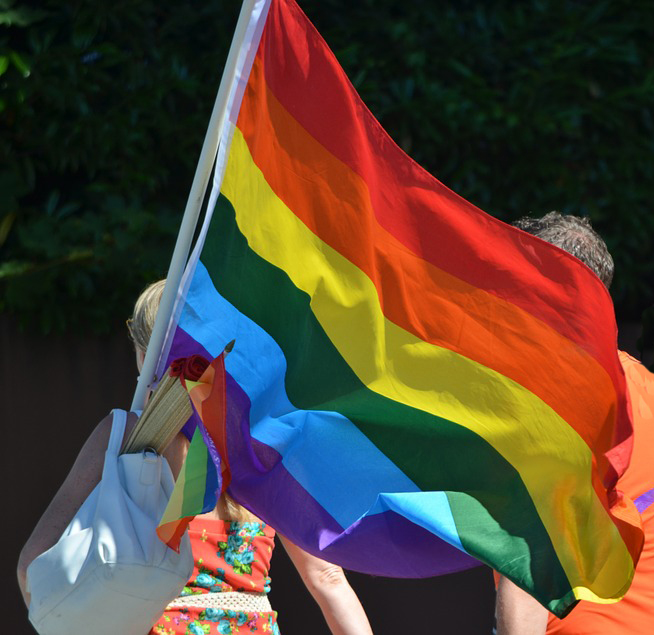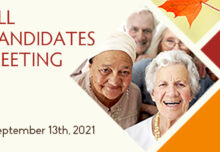Issues Concerning Seniors In The LGBTQ+ Community
Written by Susan Moore
 I find myself in an interesting quandary.
I find myself in an interesting quandary.
I have an incredible opportunity to write about the experiences of older adults who are ‘out’, which is to say, aging as a member of the LGBTQ2S+ community. At 50 years of age, will my thoughts, experiences, fears and joys be relatable to those older adults who blazed the trail before me? How do I speak to the increasing vulnerabilities of aging ‘out’ without acknowledging the tremendous love I have experienced within the LGBTQ2S+ community, a reality that was not so readily available before the community had human and civil rights expressly stated in Canadian legislation? Full disclosure, I have struggled to write this. I have worried that this will be viewed as ‘too political’ or create conflict amongst people with differing views on being gay.
So, with a deep breath in I offer you approximately 700 words that I hope will answer some questions and shed some light on aging and the LGBTQ2S+ community.
More importantly, I want to acknowledge those of you who have chosen to stay in the closet, who have gone back into the closet, who are considering ‘coming out’ and those who are living their lives out and proud: you are seen, loved, and honoured for all you have done and all that you are.
First things first, what does LGBTQ2S+ mean? Simply put, this is a widely accepted abbreviation of:
• Lesbian, Gay, Bisexual, Transgender, Queer/Questioning, 2 spirited, and others (represented by the +).
It is by no means an exhaustive list of all sexual orientations or gender identities. You will see different variations of the letters and with time, the abbreviation may grow and change. If you are unsure of the word to use to describe or identify someone or yourself, try sticking to everyday adjectives like ‘nice’, ‘funny’ or ‘intelligent’. Most of us appreciate being identified by the qualities we possess as people.
Coming Out, Living Out, Aging Out
I would be remiss if I didn’t include a brief reality check of what it has meant for so many older adults to be ‘out’.
The world is a different place now than it was 50 years ago. In the 1960’s it was a crime to be gay or lesbian. This changed somewhat when Pierre Trudeau made changes to the Canadian Criminal Code stating, “I think that what’s done in private between adults doesn’t concern the Criminal Code” (CBC News, TIMELINE | Same-sex rights in Canada). There were small, positive steps made throughout the 80’s to include the LGB community in the Canadian Charter of Rights and Freedoms, however, it wouldn’t be until 1996 that “‘sexual orientation’ was added to the Canadian Human Rights Act. In other words, LGB people couldn’t be fired or denied housing because of sexual orientation” (Qmunity, Aging Out: Moving towards queer and trans* competent care for seniors). It wasn’t until June 16, 2017 that transgender people would have the same rights.
Why does this matter?
Well, for many LGBTQ2S+ older adults, being ‘out’ was dangerous. Homosexuality was considered to be a mental illness and criminal. Many men and women couldn’t be out because of their work. Those who served in the military or on police were at particular risk. Some men and women tried to live heterosexual lifestyles because that was ‘what you had to do’. Others who ‘came out’ or who were ‘outed’ on TV during police raids at private parties, were rejected by their families.
The rainbow lining
Yes – there is a silver (and rainbow) lining. There are individuals and organized groups supporting the rights of older adults regardless of sexual or gender identity. Qmunity is an inclusive organizations that provides resources, emotional supports and programs for LGBTQ2S+ seniors. Alexandra Neighbourhood House in South Surrey published Sharing our Journeys: Queer Elders Tell their Stories. Senior housing, service providers and community agencies are actively engaging in queer competency training so all older adults can be in safe and inclusive spaces.
For more information on support and activities available to LGBTQ2S+ seniors and allies, you can contact:
• Qmunity – https://qmunity.ca or call 604-684-5307, ext. 100
• LOVE CRN – www.lovecrn.ca
• Seniors Abuse and Information Line – http://seniorsfirstbc.ca/programs/sail or call 604-437-1940 or toll free at 1-866-437-1940.
For copies of Sharing our Journeys: Queer Elders Tell their Stories, please contact Alexandra Neighbourhood House at 604-535-0015 or visit https://www.alexhouse.net/sharing-our-journeys.





